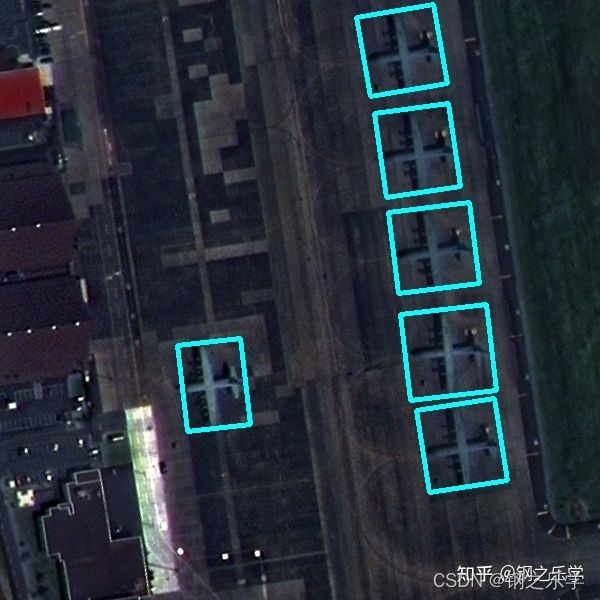【目标检测】从txt读取并可视化旋转目标边界框
欢迎光临我的知乎同款文章:https://zhuanlan.zhihu.com/p/396562363
运行环境:
python=3.7
opencv-python==4.5.2.54
opencv-contrib-python==4.5.3.56
代码一:
import os
import os.path as osp
import cv2
import numpy as np
import shutil
BASEDIR = osp.abspath('.')
IMGDIR = osp.join(BASEDIR, 'images')
LABELDIR = osp.join(BASEDIR, 'labelTxt')
OUTDIR = osp.join(BASEDIR, 'watch_GT')
if osp.exists(OUTDIR):
shutil.rmtree(OUTDIR)
os.makedirs(OUTDIR)
key_list = [name.split('.')[-2] for name in os.listdir(IMGDIR) if name.endswith('.png')]
print(key_list)
for k in key_list:
imgname = k+'.png'
labelname = k+'.txt'
path_img = osp.join(IMGDIR, imgname)
path_label = osp.join(LABELDIR, labelname)
img = cv2.imread(path_img)
with open(path_label, 'r') as fp:
lines = fp.readlines()
# print(lines)
for line in lines:
one_box_info = line.strip().split()
*xy4, cls_name, easy_token = one_box_info
xy4 = list(map(int, xy4))
xy4 = [[xy4[0],xy4[1]],
[xy4[2],xy4[3]],
[xy4[4],xy4[5]],
[xy4[6],xy4[7]]]
xy4 = np.array(xy4)
# print(xy4)
cv2.drawContours(img, [xy4], 0, color=(255, 255, 0), thickness=3)
path_out = osp.join(OUTDIR, imgname.split('.')[-2] + '_watchGT.' + imgname.split('.')[-1])
cv2.imwrite(path_out, img)
print(imgname, 'done.')
代码一,适用的标注文件格式示例:
(四顶点式标注)
177 345 240 338 250 424 187 431 C 0
356 17 433 4 447 83 370 96 C 0
374 113 448 103 460 186 386 197 C 0
469 202 479 283 398 293 388 212 C 0
400 314 486 304 496 390 410 400 C 0
416 410 494 398 507 480 429 492 C 0
= = = = = = = = = = = 分割线 = = = = = = = = = = = =
代码二:
import cv2
import numpy as np
import os
import os.path as osp
color_dict = {
0.0: (255, 000, 000),
1.0: (255, 128, 000),
2.0: (255, 255, 000),
3.0: (000, 255, 000),
4.0: (000, 255, 255),
5.0: (000, 000, 255),
6.0: (128, 000, 255),
7.0: (255, 000, 255),
8.0: (128, 000, 000),
9.0: (000, 128, 000),
10.0: (000, 000, 128)
}
def run_watch_txts(img_dir, txt_dir, out_dir, color):
IMAGEDIR = osp.abspath(img_dir)
LABELDIR = osp.abspath(txt_dir)
OUTDIR = osp.abspath(out_dir)
png_names = set([name[:-4] for name in os.listdir(IMAGEDIR) if name.endswith('.png')])
txt_names = set([name[:-4] for name in os.listdir(LABELDIR) if name.endswith('.txt')])
intersection_names = png_names & txt_names
for name in png_names:
image = cv2.imread(osp.join(IMAGEDIR, name+".png"))
if name not in intersection_names:
cv2.imwrite(osp.join(OUTDIR, name+".png"), image)
continue
IMG_H, IMG_W, IMG_C = image.shape
with open(osp.join(LABELDIR, name+".txt"), 'r') as fp:
lines = fp.readlines()
for line in lines:
line = line.strip().split(" ")
# print(line)
label = float(line[0])
cx = IMG_W * float(line[1])
cy = IMG_H * float(line[2])
w = IMG_W * float(line[3])
h = IMG_H * float(line[4])
angle = int(line[5])
rect = ((cx, cy), (w, h), (angle))
box = cv2.boxPoints(rect)
box = np.int0(box)
cv2.drawContours(image, [box], 0, color_dict[label][::-1], 2)
# cv2.imshow(" ", image)
cv2.imwrite(osp.join(OUTDIR, name + ".tif"), image)
print(name + ", done...")
if __name__ == '__main__':
BASEDIR = osp.dirname(osp.abspath(__file__))
img_dir = osp.join(BASEDIR, 'imgs')
txt_dir = osp.join(BASEDIR, 'imgs_txts')
out_dir = osp.join(BASEDIR, 'imgs_txts_watch')
if not os.path.exists(out_dir):
os.makedirs(out_dir)
run_watch_txts(img_dir, txt_dir, out_dir, color=(250, 200, 250))
代码二,适用的标注文件格式示例:
(浮点型)类别号 中心横坐标cx 中心纵坐标cy 框宽w 框高h 框的角度angle
0.0 0.4375 0.54375 0.040625 0.025 30
0.0 0.56484375 0.5822916666666667 0.0421875 0.03125 45
0.0 0.7671875 0.5572916666666666 0.03125 0.027083333333333334 60
